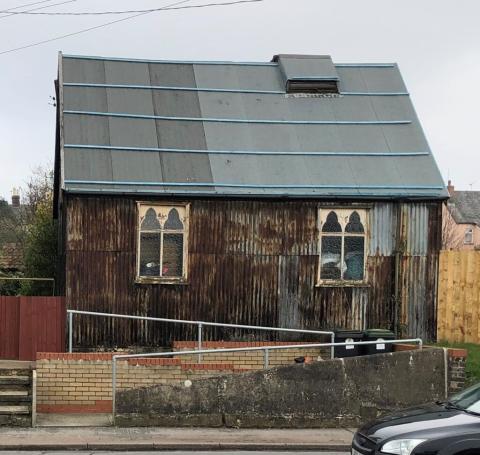Brownfield Fund to Help Transform Derelict Sites into New Homes
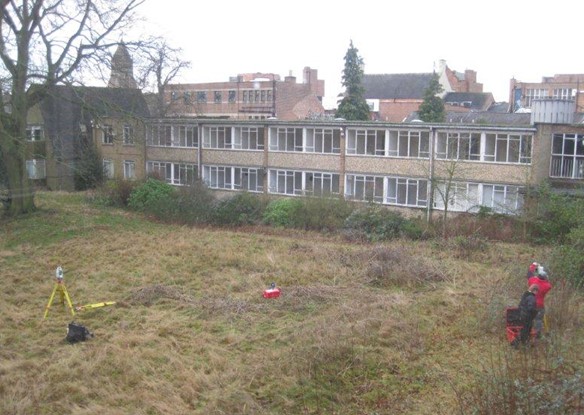 The new brownfield fund opens the potential for derelict brownfield sites across England will be transformed into thousands of new homes
The new brownfield fund opens the potential for derelict brownfield sites across England will be transformed into thousands of new homes
At the Spending Review 2021, the Chancellor announced a £1.8 billion package of investment to regenerate communities and level-up the country, unlocking new homes on derelict and underused brownfield land. Up to £180 million Brownfield Land Release Fund (BLRF2) capital grant funding is available to all constituent English councils over a three-year period to support the release of council-owned brownfield land for housing.
Councils are now able to apply for a share of the brownfield land release fund 2 with the first £40m available to bid for from 8 July to support regeneration projects. A further £140m will be allocated over the next two years.
Under the first brownfield land release fund £77 million was allocated to councils across the country releasing brownfield sites for over 7,500 new homes.
The funding will be administered through One Public Estate (OPE), a partnership between the Office of Government Property in the Cabinet Office (OGP), the Local Government Association (LGA) and the Department for Levelling Up, Housing and Communities (DLUHC).
Councils have until 19 August 2022 to submit applications via the designated accountable body of their local OPE Partnership.
Nutrient Neutrality Impact on Housing Delivery
The adverse impact of over production of nutrients is something we have known about for a long time, unfortunately there has been little coordinated action to address the matter. As my grandmother would have said “A stitch in time saves nine”, I suspect there are some who feel that on this issue we long ago passed the point where nine stitches were going to do the job but to use another we worn phrase, better late than never.
The Local Government Advisory Service says: “A growing number of local planning authorities have learned from Natural England that development in some catchments cannot proceed if it increases levels of nutrients. Their advice is that development can only proceed if it is “nutrient neutral”. We’re starting a new programme of work to support the latest cohort of councils learn from the experience of councils before them.”
A DfERA policy paper, Nutrient pollution: reducing the impact on protected sites, Published 16 March 2022, notes: “Nutrient pollution is a particular problem for our freshwater habitats and estuaries. Increased levels of nutrients (especially nitrogen and phosphorus) can speed up the growth of certain plants, disrupting natural processes and impacting wildlife. This process damages water dependent sites, harming the plants and wildlife, and affects the oxygen carrying capacity of the water. In technical terms it can put sites in ‘unfavourable condition’. The sources of excess nutrients are site specific, but predominantly originate from wastewater treatment works and agricultural pollution.”
Clearly this is an issue that housebuilders must consider at the earliest stages of planning to ensure that it can be adequately address. It is likely that ever more areas of the country will find that they are impacted by this requirement to achieve nutrient neutrality. As of March 2022, a further 42 local authorities are now affected, making a total of 74 since 2020. In the context of housing need, this is an issue which could have significant and long-running implications. The Home Builders’ Federation (HBF) has published research suggesting that due to this issue up to 100,000 homes are currently delayed.
Co-Living Scheme Coming to Battersea
We are delighted to be providing advice to Dandi Living on contaminated land for another project.
Property Wire reports: “Located on a quiet road surrounded by residential houses and apartments, Dandi Battersea benefits from being within walking distance to Clapham Junction and Wandsworth Town train stations, as well as the local amenities of the surrounding area. The site, which is almost 16,000 sq.ft., is currently sitting vacant, so the cash injection will help breathe new life into the surrounding area.” Read more
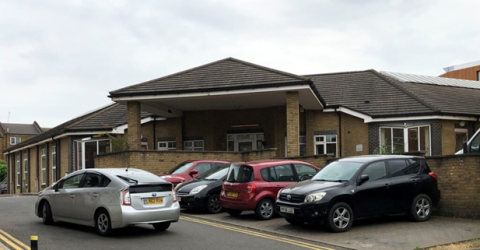
Is UK Landfill Tax Benefitting the Environment or Just the Exchequer
An interesting article by Steven Porter and Sam Wardleworth of Pinsent Masons makes the case that:
There are several areas in which the law governing landfill tax in England and Northern Ireland could be clarified so that the tax better supports the government’s environmental objectives, including achieving zero avoidable waste by 2050.
Former MoD Site in Surrey
Exciting to see the first phase of this residential development approach completion. We have been on site regularly from early on and have just completed verification for the first phase.
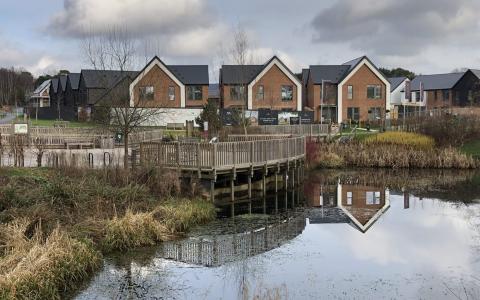
Brownfield First Report from the Environmental Industries Commission
The report looks at the practical issues and economics of brownfield development with the aim of encouraging a positive approach to the subject by government, local authorities, developers and construction and property professionals. The EIC has this to say:
The UK’s rich industrial heritage, rising population and a constrained space makes the reuse of previously developed or brownfield land an essential part of the delivery of new developments throughout the UK. Further establishing this need, Environmental Industries Commission (EIC) has launched the report, Brownfield First: making better use of our land, drawing on long-term expertise to identify ways in which development on brownfield land can be sustainably increased benefitting the environment and the economy.
While currently only 10-20% of development in the UK takes place on sites classified as brownfield, the latest statistics from the Homes and Communities Agency indicates that there is approximately 61,920 ha of brownfield land in England, with 54% considered derelict or vacant while the remainder is in some form of use with potential for redevelopment. DCLG figures (2010) suggests approximately 35,000 ha of this brownfield land is suitable for housing development, further establishing the potential of brownfield in creating sustainable communities combining housing, retail, as well as commercial or industrial development.
Brownfield First: making better use of our land is the latest is a series of EIC work on sustainable development, and contaminated land, a portfolio of work existing since EIC’s founding in 1995.
http://www.eic-uk.co.uk/eic-report-brownfield-first-making-better-use-of-our-land-/129/2/1/392
As stated by Peter Atchison, Chairman of EIC Contaminated Land Working Group, “Brownfield first offers the practical solution to two issues facing the UK: the need for more sustainable development and use of previously developed site.”
Recent reports have suggested that brownfield land has the capacity to support over 1.8 million new homes, yet despite this recent Government figures show a decline in the proportion of homes being built on such land.
It also includes before and after pictures of one of our projects!
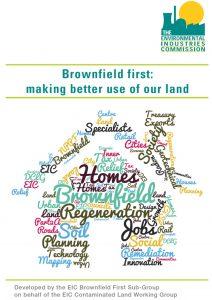
£1.8bn to Deliver Homes on Derelict Land
Hundreds of thousands of new homes will be built on derelict and unused land through a £1.8 billion package of investment to regenerate land and level up across the country, announced by the Chancellor in his Budget and Spending Review.
£300 million of locally-led grant funding will be awarded to Mayoral Combined Authorities and Local Authorities to unlock smaller brownfield sites for housing, promoting inner city regeneration and protecting the countryside.
Chancellor of the Exchequer, Rishi Sunak has said: “We are investing in better quality, safer, greener and more affordable homes to create thriving places where people want to live. One of my favourite pastimes is to go for walks in the park with my family, and I want to make sure everyone has green space on their doorstep to enjoy too. Transforming our unloved and neglected urban spaces will help protect our cherished countryside and green spaces, while improving the physical and mental health of our communities.”
A new £9 million Levelling Up Parks Fund that will enable Local Authorities to transform over 100 neglected urban spaces across the UK into ‘pocket parks’, providing small green oasis in built up areas, roughly the size of a tennis court, in built-up locations.
We warmly welcome any moves to ensure that urban regeneration is promoted in a sustainable way that greens our environment, fosters bio-diversity and improves the quality of life.
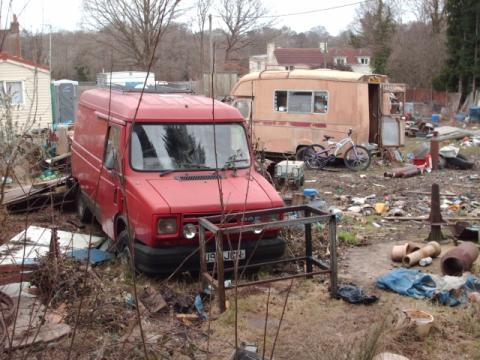
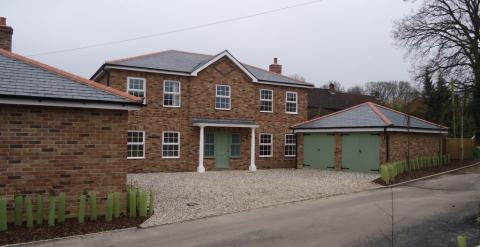
Sustainable Development & Levelling Up among ideas considered in Brownfield First
There has been a dramatic drop in new residential projects on land that had already been developed, from 40% in 2014, to just 20% in 2018.
EIC argues in their recent launch that brownfield development can help meet ambitions around levelling up, but in order to do so further planning reforms, as well as new tax reliefs and development incentives, are required.
The proposals in the report for the greenfield surcharge, which would be added to the infrastructure levy proposed in recent planning changes, would see the funds earmarked by local authorities for infrastructure spending to help mitigate the higher development costs often associated with brownfield.
Commenting on Brownfield First, Matthew Farrow, director of policy at EIC, says: “Our analysis shows that developers are making significantly less use of brownfield, yet there is huge potential for it to deliver ambitions around levelling up. Not only can it help find the space for 300,000 homes a year, but it can also funnel new investment to those traditionally underfunded post-industrial towns, cities and communities.
“Our practical, common-sense proposal around a greenfield surcharge would revitalise brownfield development, help to deliver homes, and ensure that we are making the most of this chronically underused asset.”
Additionally the report seeks improvements to the economic viability of marginal brownfield projects by increasing land remediation tax relief on sites with fewer than 25 units, and to update the definition of derelict land to incorporate all sites that have been abandoned for more than a decade.
Finally, it argues that new funding earmarked for levelling-up, either through the new National Infrastructure Bank or the Levelling Up Fund, should specifically favour brownfield proposals over greenfield.
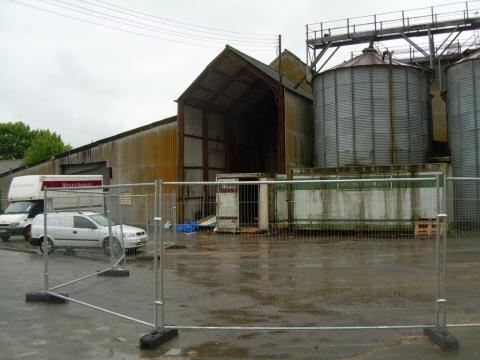
CO2nstruct Zero
The Construction Leadership Council has announced CO2nstruct Zero a programme to drive carbon out of all parts of the construction sector, from manufacturing and design to construction and operation. This move is intended to highlight those priorities that the industry must tackle in order to reduce carbon.
This is with the aim of ensuring that the construction sector to play its part in achieving the UK government’s objective of net zero for the whole economy by 2050.

The “Tin Tabernacle”
Every site is different some however are more memorable than others. We have recently completed a phase 1 walkover and desktop report for this former chapel or tin tabernacle, thus nicknamed for the obvious reason they were clad and roofed in corrugated metal sheeting. This one has been used as a store for domestic items for some years and it now looking rather sad.
